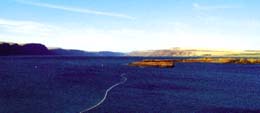On March 21, 1960, Grant County commissioners officially declare the creation of the Port of Coulee City via resolution. Weeks earlier, on March 8, 1960, voters had approved the port issue by a vote of 196-19. In the same election, voters choose the first three commissioners, C. M. Knopp, Charles Conner, and William D. Thompson. The goal of the Port, also known as Grant County Port District No. 4, is to improve recreational opportunities in Coulee City and vicinity. The district's major project in ensuing decades will be to improve Coulee City Community Park on the south end of Banks Lake, and to build two breakwaters into Banks Lake for boat moorage. The district will also acquire a World War II-era meeting hall, which will become the home of the Coulee City Medical Clinic.
Keeping Tax Dollars Home
The impetus behind the drive for a port district for tiny Coulee City (population 654 in 1960) was to ensure that local tax dollars would stay in the community. Many other areas of Grant County were also forming port districts at the time, and a local attorney, Curtiss M. Clark (1918-1981), was concerned that Coulee City would be swallowed up by another district.
"We would have been annexed by the Port of Quincy, and Curt Clark didn't want our tax money going there," said H.E. "Gene" McDonald, a Port of Coulee City commissioner since the early 1970s (McDonald).
A Park on Banks Lake
The goal of the small district was to improve recreational opportunities. So its first project was to provide funds for the city of Coulee City to improve its city park on the Banks Lake waterfront.
Then in 1974, the Port helped provide funds for a major overhaul of the park, which was then dedicated as Coulee City Community Park. The Port built a breakwater into Banks Lake that provided moorage slips for boats. A swimming area and RV sites were also developed.
In the 1970s, the Port also acquired a World War II-era meeting hall in Coulee City. The Port converted it into a medical clinic. It is now known as the Coulee City Medical Clinic and also houses a chiropractic office along with the clinic.
At one time, the Port also owned a 10-acre parcel of industrial land that was used for storage units. The Port has since sold off that property.
As of 2011, the Port has two breakwaters at the Coulee City Community Park and has plans to refurbish one of its breakwaters in order accommodate a planned lowering of Banks Lake. The Port presently owns 25 boat slips at the park, which are fully occupied.
The Port plans to keep its commitment to improving the park. "We are fortunate to be sitting on water here," said McDonald. "The park has been a godsend for the community. It has helped to keep our community together" (McDonald).
Curtiss Clark's Legacy
There is a memorial in the park to Curtiss Clark, acknowledging his role in developing both the Port and the park.
"This memorial is dedicated to C. M. 'Curt' Clark, a country lawyer, in thanks for his endless enthusiasm for the town he dearly loved," reads the plaque. "Curt worked for and supported the development and success of this park through generous donation of his personal and professional time and money. He was an inspirational supporter of anything that was for the betterment of Coulee City and the surrounding community. Thank you, Curt."
As of 2011, the current commissioners are McDonald, Joe Starkey and Dennis Jordan. The Port has no full-time staff. McDonald called it a "little, old hometown port district" (McDonald.).

